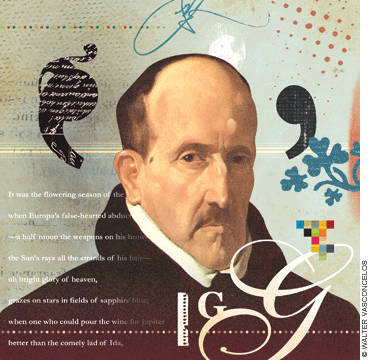
Edith Grossman CW’57 G’59 sits at a small chessboard-surfaced table in the atrium of Kelly Writers House.Her dark blouse accentuates her silhouette against the window; her face and silver hair catch the light from above. She pauses for a moment before addressing the audience.
“I want to talk to you about this book,” Grossman says in a thick, resonant voice, referring to a slim volume she holds in her hand: The Solitudes, by Luis de Góngora. “It is clearly the most difficult poem in the history of the world, in any language, anywhere, anytime.”
That’s a significant claim, but then The Solitudes is a significant piece of work. Written in 1613, the 2,000-line novel-in-verse about the encounters of a love-stricken shipwrecked mariner is widely recognized by scholars as one of the crowning achievements of the Spanish Renaissance, as well as one of the most inscrutable pieces of European literature. After giving a brief background discussion of the layered metaphors, narrative ellipses, and mythological allusions in the opening passage, Grossman then reads the opening lines aloud:
It was the flowering season of the year
when Europa’s false-hearted abductor
—a half moon the weapons on his brow,
the Sun’s rays all the strands of his hair—
oh bright glory of heaven,
grazes on stars in fields of sapphire blue;
when one who could pour the wine for Jupiter
better than the comely lad of Ida,
—a shipwrecked youth, one scorned and desolate—
weeps sweet complaints of love
to the sea; taking pity,
for the waves and for the wind
it made of his abject tears
a second sweet instrument of Arion.
The same impenetrability of The Solitudes—which left a lingering impression on Grossman since she first read this work as a graduate student—also provided some of the motivation for translating it. (Which, she acknowledges wryly, may attest to “an inherent masochism in my character.”) It is “excruciatingly difficult—and unbelievably gorgeous,” she tells her audience. “It is utterly beautiful poetry.”
Grossman’s career is marked by arduously beautiful literary challenges. Until 10 years ago, she was best known for her translation of 20th-century Spanish and Latin American fiction and poetry, including works by Nobel laureates Gabriel García Márquez and Mario Vargas Llosa. Yet her 2003 translation of Cervantes’ Don Quixote (Ecco Press)—considered the first modern European novel—received resounding praise for bringing the nuances of its 17th-century Castilian prose to present-day English. In his review of Don Quixote, Harold Bloom hailed her as “the Glenn Gould of translators, because she, too, articulates every note.”
In regard to The Solitudes, which was published by Penguin Classics in 2011, Bloom wrote: “Edith Grossman has surpassed even her magnificent version of Don Quixote by the far more difficult translation of Góngora’s Solitudes. Few European poems are as sublime as The Solitudes, and Grossman illuminates this truth.”
Grossman began her earliest translations as an undergraduate at Penn, and first published her translations of verses by Spanish poets Juan Ramón Jiménez and Gustavo Adolfo Bécquer in the Pennsylvania Literary Review. While Don Quixote and The Solitudes can be traced to her studies in Spanish peninsular literature, her translations of 20th-century Latin American poetry just a few years later provide an equally compelling point of departure. After completing her master’s degree at Penn, Grossman continued her studies at the University of California-Berkeley, where she first read contemporary Latin American poets such as Pablo Neruda and Cesar Vallejo. Neruda’s Residence on Earth was a decisive turning point.
“Verses such as ‘It so happens that I grow tired of being a man’ stirred me to the bone,” she said during an interview at a restaurant near her home in New York’s Upper West Side. “I could not believe anyone was writing this, walking the Earth during my lifetime, and that I didn’t know about him before. I decided I had to study him, and others like him.”
She would later translate poems by the Chilean avant-garde poet Nicanor Parra as part of her doctoral dissertation at New York University.
Since then, Grossman has produced intermittent translations of verse, most notably by Ariel Dorfmann and Jaime Manrique, Latin American authors residing in the United States. But it was only following the commercial success of Don Quixote that Grossman was able to publish an entire collection of 16th- and 17th-century Spanish poetry. Titled The Golden Age: Poems of the Spanish Renaissance (W.W. Norton and Company, 2006), the anthology included shorter pieces by Góngora.
The challenge of reproducing intricately structured Baroque poems foreshadows Grossman’s subsequent work in translating Góngora’s magnum opus. In The Solitudes, she adheres to stanzas of seven- and 11-syllable lines, known in Spanish as silvas—a creative decision that provides her version with a cadence that compensates for the lack of the poem’s original rhyme in English.
Grossman’s upcoming project, also from this time period, presents a similar literary Everest: translating a selection of works by Sor Juana Inés de la Cruz, a 17th–century Mexican nun, some of whose poems were also included in The Golden Age. As with Góngora, Sor Juana’s artistic achievement lies in her mastery of poetic form, Grossman suggests: “These poets, like Baudelaire with his sonnets in the 19th century, could create verses whose content was huge, in part because they used traditional forms.”
In addition to early modern poetry, Grossman continues to translate monumental works by contemporary Spanish and Latin American authors. She recently translated Antonio Muñoz Molina’s The Depths of Time, a 1,000-page novel set during the Spanish Civil War, and her translation of Vargas Llosa’s The Dream of the Celtwas published last summer.
Grossman is generous with her praise for similarly ambitious projects by a younger generation of translators, describing Natasha Wimmer’s recent translation of Roberto Bolaño’s novel 2,666 as “extraordinary.” She also commended the efforts by Rosalie Knecht, who read alongside Grossman at Kelly Writers House, to translate the experimental novels of César Aira.
By generating interest among publishers for historic or lesser-known Spanish-language works that might otherwise not reach English-speaking audiences, Grossman also continues to help create new venues. Her latest project is a fitting example: The Ingenious Gentleman and Poet Federico García Lorca Ascends to Hell, by Carlos Rojas, a professor emeritus of art history at Emory University.
During her talk at Kelly Writers House, Grossman described Rojas’s work as “one of the most creative, startling, imaginative novels I have read,” adding: “I started trying to persuade presses to publish this book about 35 years ago. I have held on to it all this time, and Yale University Press is finally bringing it out.”
That’s a long time, though not by the standards of great art. Which, for Grossman, is the measure that matters.
—Ana María Gómez López C’03 G’04
(A complete video recording of Grossman’s reading at the Kelly Writers House can be viewed at media.sas.upenn.edu/watch/129348)




